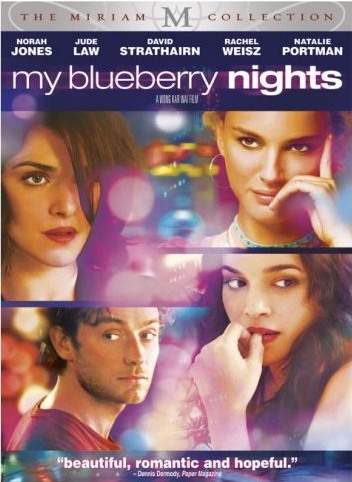My Blueberry Nights review by Jackass Tom
Summary of an e-mail I sent after watching My Blueberry Nights:
Dear Mr. David Bordwell,
I have a question that is bugging about a film I watched called My Blueberry Nights by Kar Wai Wong. He repeatedly uses this filming technique which is similar to slow motion. It seems the film is recording at a normal 24 frames per second but is "missing frames", creating a sort of dazed look. Some film makers use this during flashbacks with intense action, but Kar Wai Wong used it for maybe 1/3rd of the film. So what is this technique called?
Sincerely,
Tom Blain
I’m eagerly awaiting the answer to my question from the Film Art co-author.
My Blueberry Nights is, shamefully, the first film I have seen from director Kar Wai Wong (or Wong Kar Wai, perhaps). Wong is internationally regarded as one of the best Chinese directors if not the best. His films are often featured at Cannes and in 1997 he became the first man from China to win Best Director at the festival for Happy Together. With the relationship driven film, My Blueberry Nights he takes on the English language for the first time.
The film's main character Elizabeth (Norah Jones, in her first film role) has just realized she has been dumped by her boyfriend. She finds this out after talking to Kluch Café owner/philosopher Jeremy (Jude Law) who saw the boyfriend at his cafe with another woman. She is heartbroken and tells Jeremy to give her ex’s spare apartment keys back if he comes into the café again. Judging by the large jar full of keys and the name of his café (Kluch is “Key” in Russian), Jeremy is used to getting people’s keys after a breakup. For the next month or so, the still heartbroken Elizabeth visits the café and is offered a slice of the unloved, unwanted blueberry pie along with Jeremy’s shoulder to cry on and some friendly, bartender-like advice.
One day, out of the blue, she decides what she needs is a change of scenery. By bus, she ends up in Memphis and then later in Nevada (I believe Reno). In each locale she is exposed to a new set of characters going through their own life changing experiences. In Memphis, as a waitress/bartender she witnesses an alcoholic cop (David Straithairn) destroy himself every night because he still can’t let go of his longtime, free spirit ex-wife (Rachel Weisz). In Reno, as a casino waitress she gets financially involved with an addicted poker player (Natalie Portman) whose years at the card table and years of training under her card playing father causes her to mix up the truth with bluffing.
There was really nothing connecting the three stories other than the communication between Elizabeth and Jeremy as she wrote him about her new experiences and how they were affecting her. The purpose of the three stories was, I suppose, to show Elizabeth’s growth as a person and to show how she put herself in different environments to heal herself, but oddly her healing was mostly passive. Apart from giving some of her money to Leslie, the gambler, and talking to her about issues of trust, Elizabeth was more or less observing lives of others.
The film was beautifully shot (especially the dessert scenes in Nevada) and masterfully edited. My only complaint about the style is that director Wong used the film technique I referenced above in my e-mail to Mr. Bordwell (choppy, slow-motion-looking, missing frame technique?) quite often in the film; so often that it was distracting. Instead of using it to highlight a few moments of high tension or drama, he watered down the affect so that it was expected at nearly every moment in the film. After a while the effect “lost its edge.” It felt very forced; like a first time film student who learned a new technique and then started using it at every chance he got. Fans of Wong will no doubt hold umbrage with that comment, as he is a highly accomplished, technical director but in this one film, that’s the feeling I got.
Overall the film is enjoyable. Norah Jones holds alright in her first film role (and as the main character) but is noticeably less nuanced and more watered down than the surrounding characters. Being the only film I've seen directed by Wong, I can probably say its not his greatest accomplishment. After reading more about him in preparation for My Blueberry Nights I’m eager to see more of his work. Seeing this film alone without doing the research, however, is probably not enough to pique my interest in the director. Still on its own, its more enjoyable than the average film out there and in the dog-days of summer its probably better than most films in the theaters now.






6 out of 10 Jackasses blog comments powered by Disqus
Search
My Blueberry Nights

IMDB Link: My Blueberry Nights
DVD Relase Date: 2008-07-01
DVD Aspect Ratio: 2.35:1
DVD Extras: Trailer